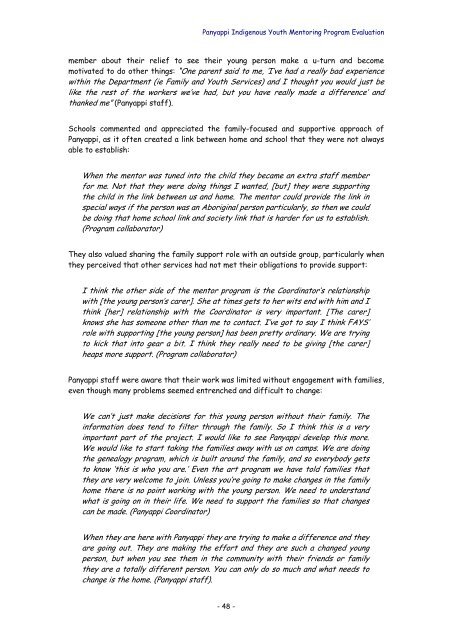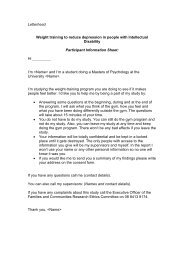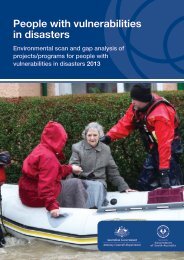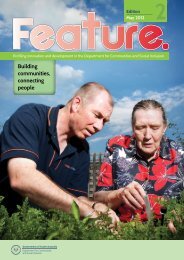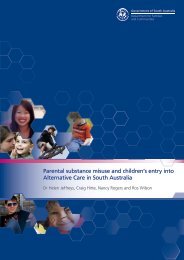Panyappi Indigenous Youth Mentoring Program Evaluation
Panyappi Indigenous Youth Mentoring Program Evaluation
Panyappi Indigenous Youth Mentoring Program Evaluation
You also want an ePaper? Increase the reach of your titles
YUMPU automatically turns print PDFs into web optimized ePapers that Google loves.
<strong>Panyappi</strong> <strong>Indigenous</strong> <strong>Youth</strong> <strong>Mentoring</strong> <strong>Program</strong> <strong>Evaluation</strong><br />
member about their relief to see their young person make a u-turn and become<br />
motivated to do other things: “One parent said to me, ‘I’ve had a really bad experience<br />
within the Department (ie Family and <strong>Youth</strong> Services) and I thought you would jus t be<br />
like the rest of the workers we’ve had, but you have really made a difference’ and<br />
thanked me” (<strong>Panyappi</strong> staff).<br />
Schools commented and appreciated the family-focused and supportive approach of<br />
<strong>Panyappi</strong>, as it often created a link between home and school that they were not always<br />
able to establish:<br />
When the mentor was tuned into the child they became an extra staff member<br />
for me. Not that they were doing things I wanted, [but] they were supporting<br />
the child in the link between us and home. The mentor could provide the link in<br />
special ways if the person was an Aboriginal person particularly, so then we could<br />
be doing that home school link and society link that is harder for us to establish.<br />
(<strong>Program</strong> collaborator)<br />
They also valued sharing the family support role with an outside group, particularly when<br />
they perceived that other services had not met their obligations to provide support:<br />
I think the other side of the mentor program is the Coordinator’s relationship<br />
with [the young person’s carer]. She at times gets to her wits end with him and I<br />
think [her] relationship with the Coordinator is very important. [The carer]<br />
knows she has someone other than me to contact. I’ve got to say I think FAYS’<br />
role with supporting [the young person] has been pretty ordinary. We are trying<br />
to kick that into gear a bit. I think they really need to be giving [the carer]<br />
heaps more support. (<strong>Program</strong> collaborator)<br />
<strong>Panyappi</strong> staff were aware that their work was limited without engagement with families,<br />
even though many problems seemed entrenched and difficult to change:<br />
We can’t just make decisions for this young person without their family. The<br />
information does tend to filter through the family. So I think this is a very<br />
important part of the project. I would like to see <strong>Panyappi</strong> develop this more.<br />
We would like to start taking the families away with us on camps. We are doi ng<br />
the genealogy program, which is built around the family, and so everybody gets<br />
to know ‘this is who you are.’ Even the art program we have told families that<br />
they are very welcome to join. Unless you’re going to make changes in the family<br />
home there is no point working with the young person. We need to understand<br />
what is going on in their li fe . We need to support the famili es so that changes<br />
can be made. (<strong>Panyappi</strong> Coordinator)<br />
When they are here with <strong>Panyappi</strong> they are trying to make a difference and they<br />
are going out. They are making the effort and they are such a changed young<br />
person, but when you see them in the community with their friends or family<br />
they are a totally different person. You can only do so much and what needs to<br />
change is the home. (<strong>Panyappi</strong> staff).<br />
- 48 -


